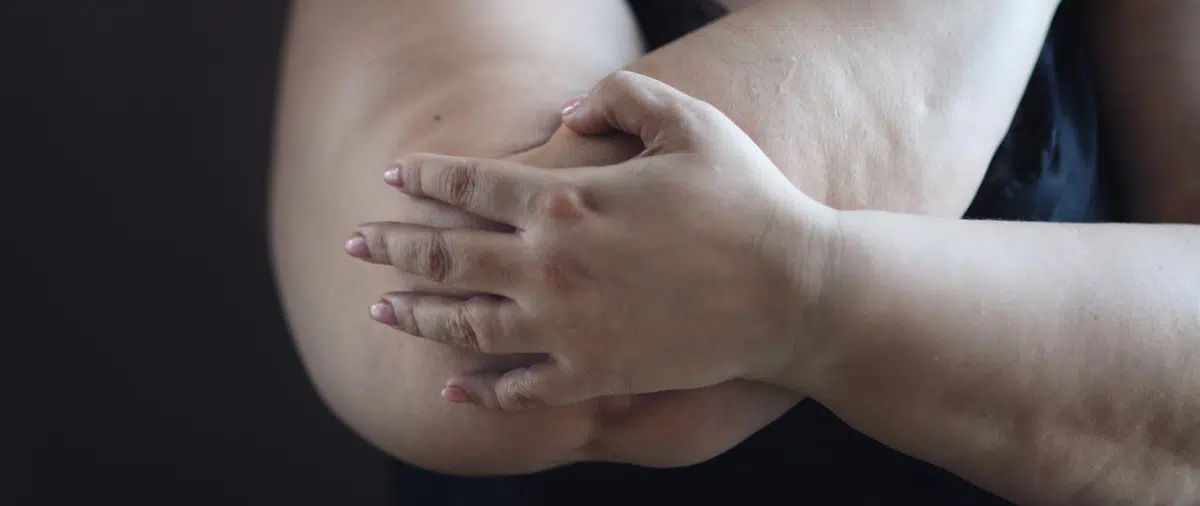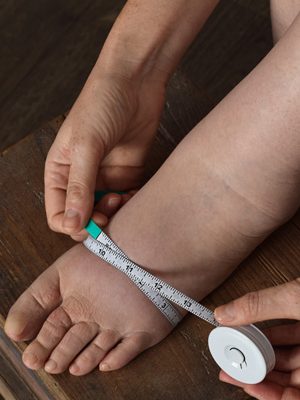Obesity and lymphedema

What You Need to Know About Obesity and Lymphedema
What is Lymphedema?

Lymphedema is a chronic but treatable condition marked by an accumulation of lymph fluid (swelling) in areas of the body where lymphatic vessels or nodes are damaged or inadequate. It affects an estimated 3-5 million Americans, with a significant portion being cancer survivors. Lymphedema is categorized into two types:
- Primary Lymphedema: A hereditary condition accounting for about 10% of cases.
- Secondary Lymphedema: Caused by damage to the lymphatic system, often due to cancer treatment, surgery, or trauma, and makes up 90% of cases.
With proper treatment, people with lymphedema can lead fulfilling lives.
What is Obesity?

Obesity refers to an excessive accumulation of fat that poses health risks. A person is classified as obese if they have a body mass index (BMI) of 30 or higher. Obesity is linked to numerous health conditions, including high blood pressure, heart disease, and compromised lymphatic function, which can lead to lymphedema.
Are Obesity and Lymphedema Linked?
Yes, obesity can increase the risk of developing lymphedema. The extra weight puts added pressure on the lymphatic system, reducing its efficiency. Research has found a strong connection between severe obesity and the development of secondary lymphedema.
Signs and Symptoms of Lymphedema in Obese Patients

- Pain: Lymphedema-related swelling can cause pain, primarily if not appropriately managed.
- Swelling: Lymph fluid buildup in fatty tissues causes swelling, which can be painful or purely cosmetic.
- Decreased Range of Motion: Swelling may restrict movement, but this typically improves as the swelling is reduced.
- Hardened Skin/Fibrosis: Severe lymphedema can cause the skin to harden and develop a tough texture, often referred to as fibrosis.
- Limb Heaviness: Swollen limbs may feel heavy, and this sensation is often exacerbated in obese patients.
- Numbness: Tingling or numbness may occur in the affected areas.
- Pitting: Pressing a finger into swollen skin may leave an indentation, a common sign of lymphedema.
Treatment Options for Obesity-Related Lymphedema

- Weight Management: Maintaining a healthy weight is crucial in managing lymphedema. In cases where diet and exercise alone aren’t effective, bariatric surgery or a medically supervised weight loss program may be recommended.
- Manual Lymphatic Drainage (MLD): A gentle massage technique that encourages lymph fluid movement and helps relieve swelling.
- Compression Therapy: Custom-fit compression garments are crucial for managing lymphedema by promoting lymphatic fluid flow and preventing fluid accumulation. At Innovative Therapy PC, we partner with Mediven® to provide personalized compression garments tailored to each patient’s unique measurements.
- For more severe cases, flat-knit compression garments are recommended for their stability and containment of swelling.
- Inelastic compression wraps like Circaid® offer another option, providing more accessible application and effective edema management.
- Pneumatic Compression Devices: These devices use inflatable chambers to gently encourage lymphatic fluid flow, reducing swelling and associated symptoms.
What You Can Do?
If you’re concerned about obesity-related lymphedema or need help managing your weight to reduce your risk, consulting with a doctor or weight loss specialist is essential. At Innovative Therapy PC, we can provide guidance on weight management, physical activity, and custom compression solutions tailored to your needs. Managing your weight is not only beneficial for overall health but also a critical factor in preventing and managing lymphedema.
